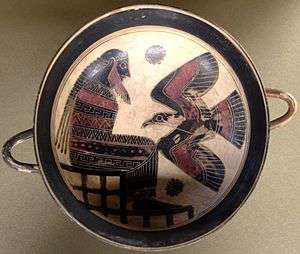Ephor
The ephors were leaders of ancient Sparta, and its colonies of Taras and Heraclea, and shared power with the two Spartan kings. The ephors were a council of five elected annually who swore "on behalf of the city" while the kings swore for themselves.[1]
.jpg)
| Sparta |
 Zeus on his throne with his eagle This article is part of the series: |
| Great Rhetra Laws of Lycurgus Politeia |
|---|
| List of Kings of Sparta Gerousia Ephorate Apella Spartiates Perioeci Helots Agoge Syssitia |
|
Spartan army • Other Greek city-states • Law Portal |
Herodotus claimed that the institution was created by Lycurgus, while Plutarch considers it a later institution. It may have arisen from the need for governors while the kings were leading armies in battle. The ephors were elected by the popular assembly, and all citizens were eligible. They were forbidden to be re-elected and provided a balance for the two kings, who rarely co-operated. Plato called the ephors tyrants who ran Sparta as despots while the kings were little more than generals. Up to two ephors would accompany a king on extended military campaigns as a sign of control, and they held the authority to declare war during some periods in Spartan history.[2] There were a total of seven ephors, consisting of the two kings and the five who were elected.
According to Plutarch,[3] every autumn at the crypteia, the ephors would pro forma declare war on the helot population so that any Spartan citizen could kill a helot without fear of blood guilt.That was done to keep the large helot population in check.[4]
The ephors did not have to kneel down before the Kings of Sparta and were held in high esteem by the citizens because of the importance of their powers and because of the holy role that they earned throughout their functions. Since decisions were made by majority vote, Sparta's policy could change quickly, when the vote of one ephor changed. For example, in 403 BC, Pausanias convinced three of the ephors to send an army to Attica, a complete reversal of the policy of Lysander.[5]
Cleomenes III abolished the ephors in 227 BC, but they were restored by the Macedonian King Antigonus III Doson after the Battle of Sellasia in 222 BC. Although Sparta fell under Roman rule in 146 BC, the position existed into the 2nd century AD, when it was probably abolished by Roman Emperor Hadrian and superseded by imperial governance as part of the province of Achaea.
Legal power
The ephors held numerous duties in legislative, judicial, financial, and executive matters.[6] Following Lycurgus' 'Asteropus' in 620 BCE (increase in the power of the ephorate),[7] the ephors became the ambassadors of Sparta. They handled all matters associated with foreign relations, including the creation of treaties with foreign powers[8] and meeting with emissaries to discuss foreign politics. They held power within Sparta by also acting as the Presidents of the assembly and the justices of the supreme civil court as well as controlling army composition.[9]
Two ephors were always sent on military expeditions to ensure the king acted in line, and if not, could put the king on trial. Many kings were put on trial by the ephors, including Leotychidas, who was found to have accepted a bribe from the Thessalians during his military expedition to Thessaly.[10]
The ephors, along with the Gerousia, held the majority of the power within the Spartan government, as the two kings had to consult either with the ephors or the Gerousia in almost any official matter.[9] The ephors also held power over the (Helots and the Perioeci). They controlled the Crypteia, the secret police who repressed the Helots), and they were even able to sentence Perioeci to death without a trial.[10]
There were times when the legal power of an ephor was taken advantage of. Such is the case with Alcibiades' use of Endius, who persuaded the Spartans to allow Alcibiades to take control of Sparta's peace mission to Athens in 420 BCE.[11]
Etymology
The word "ephors" (Greek ἔφοροι éphoroi, plural form of ἔφορος éphoros) comes from the Greek ἐπί epi, "on" or "over", and ὁράω horaō, "to see", i.e. "one who oversees" or "overseer".
Contemporary uses
The concept of an ephorate continues to be used by some contemporary organizations which require a monarchical element within a democratic framework. One such organization is the Ephorate of the Rascals, Rogues, and Rapscallions, an American fraternal research society.[12]
References
- Xenophon, Constitution of Sparta they collected taxes and in forced laws in Sparta. 15.7.
- Nicolas Richer (1998). Les éphores. Études sur l'histoire et sur l'image de Sparte (VIIIe-IIIe siècle avant Jésus-Christ). Histoire ancienne et médiévale 50. Pantheon-Sorbonne University. p. 636. ISBN 2-85944-347-9.
- Life of Lycurgus, 28, 3–7.
- Xenophon, Constitution of Sparta 15.6; Xenophon, Hellenica 2.3.9–10; Plutarch, Agis 12.1, 16.2; Plato, Laws 3.692; Aristotle, The Politics 2.6.14–16; A.H.M. Jones, Sparta
- Donald Kagan, The Outbreak of the Peloponnesian War. page 29. Ithaca/New York 1969, ISBN 0-8014-9556-3.
- Ancient Sparta – description of governmental system
- Dickins, G. (1912). The Growth of Spartan Policy. The Journal of Hellenic Studies, 32, 1-42. doi:10.2307/624130
- Millender, E. (2001). Spartan Literacy Revisited. Classical Antiquity, 20(1), 121-164. doi:10.1525/ca.2001.20.1.121
- Thomas, C. (1974). On the Role of the Spartan Kings. Historia: Zeitschrift Für Alte Geschichte, 23(3), 257-270. Retrieved from http://www.jstor.org.ezproxy.acadiau.ca:2048/stable/4435402
- Bonner, Robert J.; Smith, Gertrude (1942). "Administration of Justice in Sparta". Classical Philology. 37 (2): 113–129. doi:10.1086/362592. ISSN 0009-837X. JSTOR 264337.
- Kebric, Robert B. (1976). "Implications of Alcibiades' Relationship With Endius". Mnemosyne. 29 (1): 72–78. doi:10.1163/156852576x00078. ISSN 0026-7074.
- Constitution of the RR&R Ephorate
External links
- . Encyclopædia Britannica (11th ed.). 1911.
- The Ephorate of the Rascals, Rogues, and Rapscallions